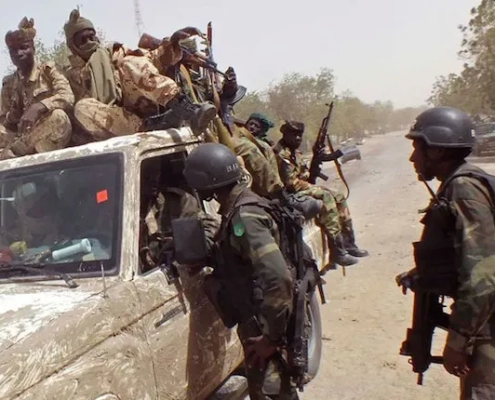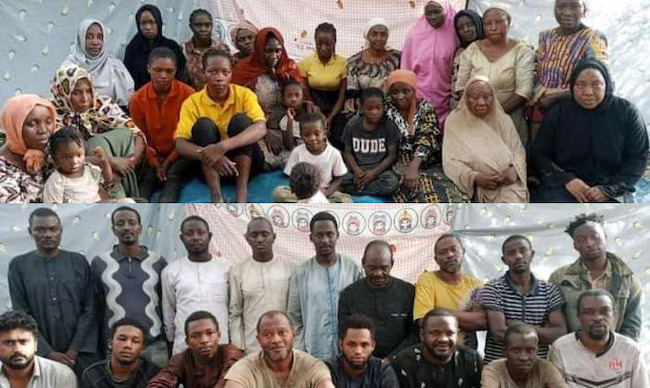Impact of Insurgency in North West Nigeria
Insurgency in Nigeria
Introduction
At the end of March 2022, Arete published a deep dive report into the attack on the Abuja Kaduna train that took place on 28 March. At the time, the details of that incident were slowly becoming clearer, but the motivation and the impact of the incident remained uncertain. In the four months since the attack, a picture has emerged of a much deeper-rooted problem for the Federal Government than a single group carrying out an isolated attack for quick financial gain. What has become apparent is that the Nigerian Government has yet another insurgency to address, but this time it is happening right on the doorstep of the seat of government. The implications of this, as we enter the election campaigning period ahead of next year’s elections, are profound.
An Expanding Problem for the Government
In the intervening period since the end of March, insurgents based in Niger State have:
- Continued to kidnap travellers plying the road between the capital land Kaduna – the gateway to the North.
- Attacked the security forces – particularly in and around Suleja, which is the key point between the areas in Niger State where they have their bases and the target rich Abuja-Kaduna corridor.
- Attacked a convoy of the Presidency in Katsina State – the President’s home state.
- Attacked Kuje Prison in the Federal Capital Territory, releasing hundreds of inmates including a large number of jailed insurgents.
- Attacked a patrol of the elite 7th Guards Brigade in Bwari, a satellite town of Abuja lying to the north-west of the capital
The insurgents have demonstrated capability and intent to mount bold attacks in areas that previously had been regarded as relatively secure compared to other parts of the country. It is believed that the insurgents are now present and occupy bases in six local government areas of Niger State and mount their attacks into the FCT and Kaduna State from these areas.

Clearly, this evolving threat presents a massive challenge to the authority of the government at a time when the security situation in many parts of the country is becoming one of the main subjects discussed by people examining the political future of the nation. The boldness of the attacks and the proximity to the seat of government for the country have galvanised these discussions both within the government and among its political opponents. But could the emergence of this new challenge to the authority of the state have been predicted? A body of thought that says it could is gathering strength and momentum.
So, what were the drivers behind the formation of this powerful new group?
Anecdotal information indicates that the insurgents, some reports numbering them in tens of thousands (although the figure is more likely to be less than a thousand), are comprised of youths who had previously been mobilised to act as enforcers in the previous elections in 2019. They were paid and provided with weapons to ensure the vote went a particular way and they were also promised jobs and other benefits after those election. It is suggested that these promises were quickly forgotten by the political sponsors and patrons, leaving a large number of disgruntled and resentful youths in possession of firearms.
Since the 2019 elections, we have witnessed the North-West geopolitical region become the most unstable, with the highest rate of kidnapping and almost daily attacks on communities by gangs of roving bandits who travel on motorcycles and pick-up trucks. The timeline and geography of this evolution fits with the narrative.
Could this situation have been foreseen?
There is a precedent for type of event with an almost identical sequence of events occurring in the Niger Delta following the 2003 elections, i.e., when large numbers of youths who had been armed by political patrons to support their election campaigns were abandoned once the elections were over.
In this regard it could be argued that the situation in the North-West could have been anticipated and the drivers of the instability addressed before the situation deteriorated to its current extent.
Conclusions
The collapse of security in the North-West over the last three years has been widely discussed and the details of the individual incidents are well known. However, the developments since the March 28th attack on the train have taken on a new, and much more threatening, dimension for the Federal Government. Against a background of widespread, diverse and expanding security challenges throughout the country, the situation in the North-West threatens to become a major political liability for the APC in the forthcoming elections, with some well-placed commentators suggesting that the APC already might be mortally wounded by it.
The security organs of the state continue to wrestle with the challenge of finding a solution to the situation, but to date they have been reacting to an adversary who enjoys a secure operating base and considerable freedom to move, giving them the initiative and the confidence to strike wherever and whenever they choose. While the immediate impact is being felt in the FCT-Kaduna-Niger tri-State border areas, the insurgent campaign threatens to have enormous impact on the elections, resulting in a profoundly destabilising effect on the nation as a whole. Some commentators are starting to talk about the ‘Balkanisation of Nigeria’, which is a scenario that would have huge strategic implications in the wider regions around Nigeria.
Timeline of Events in the FCT-Kaduna-Niger Tri-State area – April-July 2022
26 April – Attackers release images of some of the abducted train passengers.

06 May – The pressure from the families of the abducted Abuja-Kaduna passengers may have forced the Nigeria Railway Corporation (NRC) to put a hold on the resumption of train services within that route.
12 May – Three Nigerian police officers were killed when an ISWAP cell ambushed a police team in the town of Suleja in Nigeria’s north-central state of Niger, near the country’s capital city.
15 May – The train attackers release one of the hostages – a heavily pregnant woman. In a video message circulating on social media, the woman said the abductors told her she had been freed on “compassionate grounds”.
20 May – The Nigerian Railway Corporation (NRC) suspended the resumption of train services on the Abuja-Kaduna route.
29 May – The train attackers’ withdraw their previous threat to stop feeding the over 60 abducted passengers of the Abuja-Kaduna bound train and to start executing the victims
31 May – video released showing passengers pleading for government intervention. One of the passengers was a course-mate of VP Osinbajo when they were at Lagos Law School.
08 June- Two of the abducted passengers of the Abuja-Kaduna train regain their freedom after spending 72 days in captivity.
15 June – 11 of the abducted train passengers are released by their captors.
21 June – President Muhammadu Buhari has directed increased efforts toward rescuing kidnapped railway passengers still in custody and bringing the case to a close. Garba Shehu, Senior Special Assistant to the President on Media and Publicity, on Tuesday said upon the President’s approval, rescue efforts are taking a two-lane approach, the kinetic and non-kinetic, to ensure the captives’ safe release. Shehu said the kidnappers made a demand for the release of their own children and upon the settlement of that issue, they let go eleven of the victims, even though more were expected.
29th June 2022 – Mohammed Al’Amin, one of the remaining 50 hostages of the abducted Abuja-Kaduna train passengers was shot by his captors. The incident occurred during “friendly exchanges of fire at the forest between the abductors that are guarding the victims and preventing them from possible escape.” Although the victim was critically wounded but still alive and in need of medical attention, appeals to the insurgents to release the wounded victim for access to medical care were “vehemently refused”.
04 July – ISWAP claims responsibility for another attack in Suleja, killing a policeman
05 July – ISWAP attacks Kuje Prison in Abuja, which housed more than one thousand inmates. They attacked using explosives to breach the walls and then entered the prison with small arms. 600 inmates including 67 Boko Haram terrorists were said to have been freed during the attack. The attackers were able to operate inside the facility for almost four hours without facing any response.
07 July – 7 abducted train passengers were released by the insurgents. Families of the released passengers stated that ransoms of 100m naira per victim and 200m naira for a Pakistani were paid. 200m was paid in Naira and the remaining 600m was paid in the equivalent in dollar value. These released captives stated that the terrorists celebrated when they returned to the camp with prisoners they had released from Kuje Prison.. This indicates that the train attackers and the prison attackers are the same group.
10 August – 7 further abducted train passengers were released, 6 members of the same family including 3 children aged between 18 months and 7 years old, along with an unrelated 60-year-old woman. It is not clear if any ransom was paid to the terrorists for their release.

